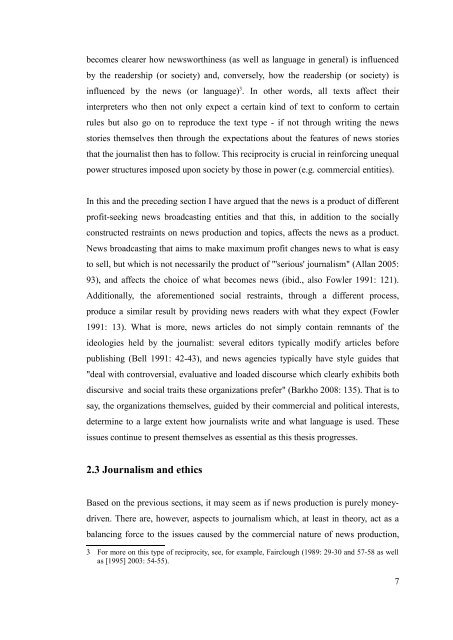Political Bias on BBC, CNN, and Fox News - Doria
Political Bias on BBC, CNN, and Fox News - Doria
Political Bias on BBC, CNN, and Fox News - Doria
You also want an ePaper? Increase the reach of your titles
YUMPU automatically turns print PDFs into web optimized ePapers that Google loves.
ecomes clearer how newsworthiness (as well as language in general) is influenced<br />
by the readership (or society) <strong>and</strong>, c<strong>on</strong>versely, how the readership (or society) is<br />
influenced by the news (or language) 3 . In other words, all texts affect their<br />
interpreters who then not <strong>on</strong>ly expect a certain kind of text to c<strong>on</strong>form to certain<br />
rules but also go <strong>on</strong> to reproduce the text type - if not through writing the news<br />
stories themselves then through the expectati<strong>on</strong>s about the features of news stories<br />
that the journalist then has to follow. This reciprocity is crucial in reinforcing unequal<br />
power structures imposed up<strong>on</strong> society by those in power (e.g. commercial entities).<br />
In this <strong>and</strong> the preceding secti<strong>on</strong> I have argued that the news is a product of different<br />
profit-seeking news broadcasting entities <strong>and</strong> that this, in additi<strong>on</strong> to the socially<br />
c<strong>on</strong>structed restraints <strong>on</strong> news producti<strong>on</strong> <strong>and</strong> topics, affects the news as a product.<br />
<strong>News</strong> broadcasting that aims to make maximum profit changes news to what is easy<br />
to sell, but which is not necessarily the product of "'serious' journalism" (Allan 2005:<br />
93), <strong>and</strong> affects the choice of what becomes news (ibid., also Fowler 1991: 121).<br />
Additi<strong>on</strong>ally, the aforementi<strong>on</strong>ed social restraints, through a different process,<br />
produce a similar result by providing news readers with what they expect (Fowler<br />
1991: 13). What is more, news articles do not simply c<strong>on</strong>tain remnants of the<br />
ideologies held by the journalist: several editors typically modify articles before<br />
publishing (Bell 1991: 42-43), <strong>and</strong> news agencies typically have style guides that<br />
"deal with c<strong>on</strong>troversial, evaluative <strong>and</strong> loaded discourse which clearly exhibits both<br />
discursive <strong>and</strong> social traits these organizati<strong>on</strong>s prefer" (Barkho 2008: 135). That is to<br />
say, the organizati<strong>on</strong>s themselves, guided by their commercial <strong>and</strong> political interests,<br />
determine to a large extent how journalists write <strong>and</strong> what language is used. These<br />
issues c<strong>on</strong>tinue to present themselves as essential as this thesis progresses.<br />
2.3 Journalism <strong>and</strong> ethics<br />
Based <strong>on</strong> the previous secti<strong>on</strong>s, it may seem as if news producti<strong>on</strong> is purely m<strong>on</strong>ey-<br />
driven. There are, however, aspects to journalism which, at least in theory, act as a<br />
balancing force to the issues caused by the commercial nature of news producti<strong>on</strong>,<br />
3 For more <strong>on</strong> this type of reciprocity, see, for example, Fairclough (1989: 29-30 <strong>and</strong> 57-58 as well<br />
as [1995] 2003: 54-55).<br />
7

















